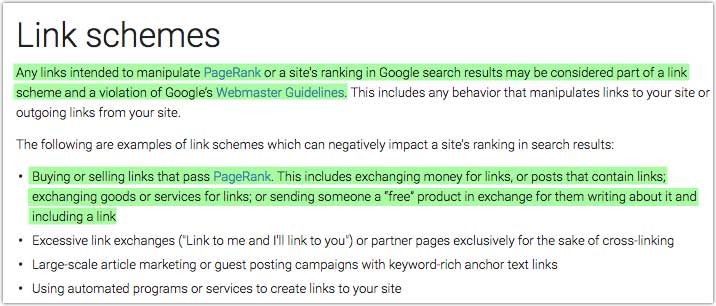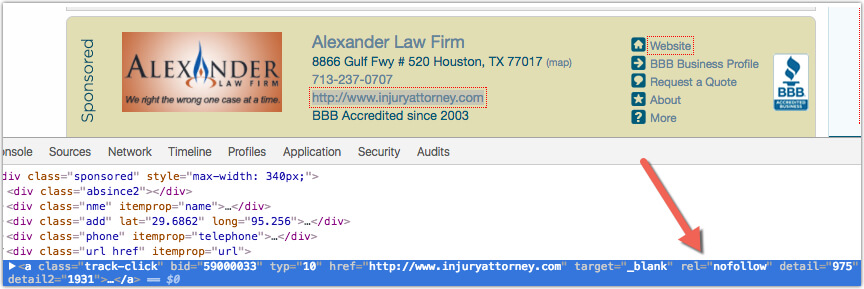
Backlinks continue to be the primary driver of high search engine rankings.
Why? Because backlinks are normally very difficult to get, and a site that does get them is seen by Google as an “authority” website.
One of the simplest ways to get backlinks is to buy them. But are paid links effective in terms of boosting your website’s rankings?
Let’s explore.
Google says they don’t want people buying links
It’s no secret that paid links go against Google’s quality guidelines. Google has held this position for years:

But like many of Google’s statements regarding SEO tactics, one look at real world search results indicates that not only are paid links not punished by Google, they’re rewarded.
Paid links are effective in competitive legal markets
To illustrate how Google appears to be all talk when it comes to enforcing paid link abuses, let’s look at a website that ranks in the top three organic results for highly competitive keywords:
URL: https://baumgartnerlawyers.com/
Keyword Example: [houston personal injury lawyer]
Suggested CPC: $135.11
Google Ranking: #2 Organic
Of this website’s top 30 backlinks, 10 are obvious paid links:
- http://www.milliondollaradvocates.com/Member_List.html – Membership purchase
- http://forum.snitz.com/donations.asp – Donation
- http://www.redmine.org/projects/redmine/wiki/Donors – Donation
- http://www.worldthrombosisday.org/action/partners-events/ – Sponsorship
- http://www.ghsa.org/html/about/assoc_members.html – Membership purchase
- http://www.mediate.com/Texas/ – Membership purchase
- http://www.findapersonalinjuryattorney.com/Blogs.aspx – Directory listing purchase
- http://www.jasminedirectory.com/business-marketing/law/ – Directory listing purchase
- http://americawalks.org/about-us/sponsors/ – Sponsorship
- http://www.business.com/misc/legal/ – Directory listing purchase
Another nine of the site’s top 30 links were gained as a result of a scholarship contest that the firm offers. While this does not involve an explicit exchange of cash for links, one could make a strong case that it still goes against Google’s guidelines, since the links would never have been placed without the firm offering up cash:
- http://www.phoenix.edu/tuition_and_financial_options/scholarships/external-scholarships.html
- http://www.callutheran.edu/financial-aid/scholarships-grants/outside-scholarships.html
- http://www.oll.usouthal.edu/departments/financialaffairs/scholarships/externalscholarshipsa-z.html
- http://www.columbiabasin.edu/index.aspx?page=106
- http://personal-injurylasvegas.net/scholarship-directory/
- http://louisville.edu/financialaid/scholarships/outside-scholarships.html
- http://marketersmedia.com/baumgartner-law-firm-announces-2016-scholarship-winner/136626
- http://www.law.northwestern.edu/admissions/tuitionaid/grants/outsidescholarships.html
- https://www.law.unlv.edu/students/external-scholarships
So, at the very least, ten of this firm’s top 30 backlinks are explicitly paid links. Another 9 of them were gained as a result of the firm’s promise to pay out cash to a scholarship winner. That means that two thirds of this top-ranked website’s best links are of the paid link variety.
This example is NOT an outlier. We see legal websites whose best links are paid links performing well in incredibly competitive markets all the time.
So, should I buy links or not?
Reality is this: Even though Google doesn’t want to reward sites that buy links, in many legal niches, you’re unlikely to rank highly for your primary keywords in the absence of paid links.
If you do decide to pay for backlinks to get your site moving, it’s critical to consider the following factors.
Factors to consider when evaluating paid link options
-
-
Website relevance
-
In general, you want to avoid paying for links on websites that have nothing to do with your firm’s services or mission. If your law firm does business litigation and you find yourself considering purchasing a link on a technology forum, think again.
Alternatively, if you’re a business litigation law firm and you’re considering sponsoring a local non-profit that helps encourage young entrepreneurs, this makes much more sense because this group’s website is relevant to your firm’s services and mission.
-
-
Authority of the linking page
-
If you’re spending good money on a link it’s crucial that you know the “authority” of the page that will contain the link to your site. Notice that I’m not saying that you need to know the authority of the website overall, but rather, that you need to know the authority of the specific linking page.
For example, have a look at this page:
http://lawyers.findlaw.com/lawyer/firm/personal-injury-plaintiff/houston/texas
Using the Moz Open Site Explorer, I can see that this page has an authority of 35/100:

This is a pretty good page authority. But, what happens if your link doesn’t get placed on this page, and instead is buried in a deep archive page:
http://lawyers.findlaw.com/lawyer/firm/personal-injury-plaintiff/houston/texas?random=656&stq=80

All of a sudden, you’re getting a lot less value for your money.
-
-
Followed link or nothing
-
If you’re going to spend good money on a link, it’s essential that the link be of the followed variety. Many sites that sell links do not make it clear that the link you recieve will be a “nofollow” link.
While there is evidence that nofollow links could still have positive ranking benefits in certain cases, they’re certainly not optimal, especially when your paying for them.
The BBB is a great example of this. You can pay $600+ per year for a listing on BBB.org, but you’ll get the same nofollow link as their free, non-accredited profiles.

Takeaways
- Technically, paid links are against Google’s quality guidelines, but…
- Many of the top rankings legal websites in the most competitive markets rely on paid links
- If you do decide to buy links, you should consult with an experienced SEO professional before buying to ensure that you maximize benefit and minimize risk
